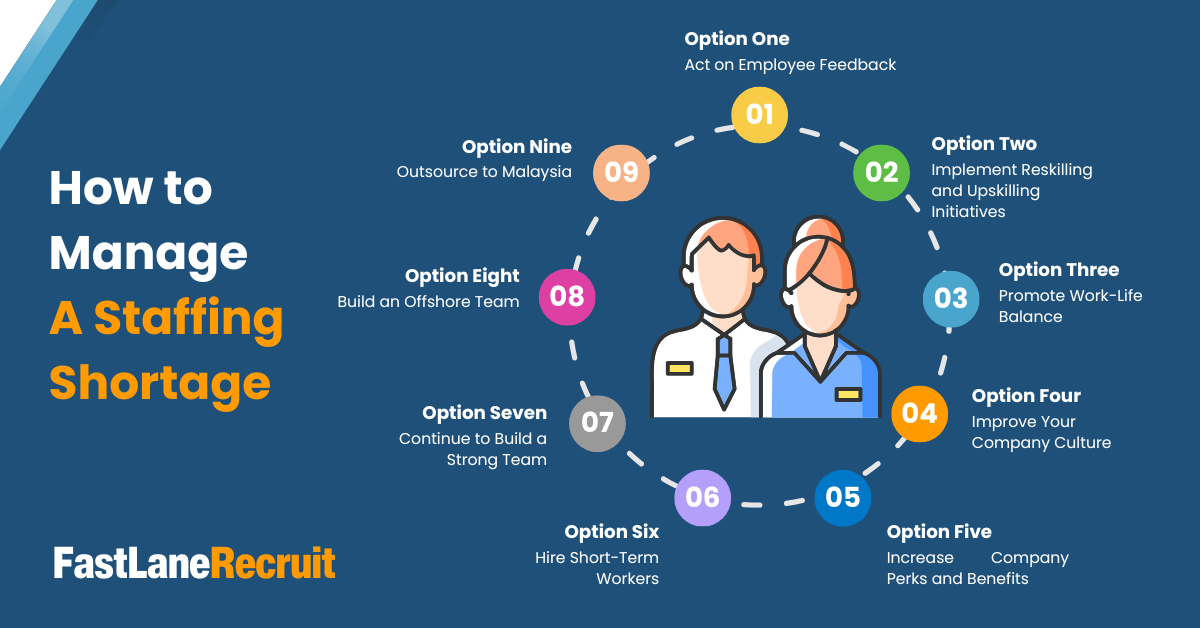Staffing shortages have become a persistent challenge for businesses across Hong Kong, especially in industries like healthcare, retail, logistics, and professional services. According to Hong Kong’s Labour Department, workforce demand has significantly outpaced supply in several sectors due to a shrinking talent pool and ongoing market volatility.
For business leaders, this situation calls for more than just quick fixes. It requires a proactive and multifaceted strategy to retain existing employees, improve productivity, and attract new talent. In this article, we will explore actionable methods to manage staffing shortages while maintaining operational efficiency and workforce morale.
Outline
Key Summary
Staffing shortage requires strategic planning
Hong Kong’s staffing shortage requires strategic, proactive workforce management.
Employee engagement is essential
Engage existing employees through feedback, skill development, and work-life balance to boost morale and productivity.
Retention depends on culture and benefits
Improve retention by fostering a strong company culture and expanding meaningful perks.
Temporary hires can bridge the gap
Use short-term talent to fill urgent gaps while building a long-term recruitment pipeline.
Offshoring offers a scalable solution
FastLaneRecruit offers offshore staffing and outsourcing to Malaysia, your solution for bridging local talent gaps with reliable and skilled support.
Act on Employee Feedback
Current employees are your most valuable asset during a staffing shortage. Their insights offer a direct line to understanding workflow bottlenecks, pain points, and operational inefficiencies that may be exacerbated by a reduced team size.
How to take action:
- Regular surveys and one-on-one check-ins: Use anonymous tools or scheduled team sessions to gather feedback.
- Feedback loops: Make visible changes based on what employees share. This reinforces trust and boosts morale.
- Exit interviews: Understand why employees leave to prevent further attrition.
Companies that listen and respond to employee feedback often enjoy higher retention and better internal collaboration, critical when headcount is low.
Also Read: How to Effectively Hire and Manage Remote Employees: A Comprehensive Guide
Implement Reskilling and Upskilling Initiatives
With limited access to new talent, optimizing the skills of your current workforce is key. Through structured learning programs, you can realign existing roles to meet evolving business needs.
Key initiatives:
- Cross-training: Train employees in multiple roles to ensure coverage and flexibility.
- Digital training platforms: Leverage platforms like LinkedIn Learning, Coursera, or the VTC’s Skills Upgrading Scheme Plus to provide ongoing education.
- Job rotation programs: Encourage internal mobility so employees gain broader experience and stay engaged.
Investing in skills development also sends a clear message that your company supports career growth, essential for retention in a tight labor market.
Also Read: Why Do Companies in Hong Kong Choose to Hire Offshore?
Promote Work-Life Balance
When teams are short-staffed, remaining employees often take on extra responsibilities. Over time, this leads to stress, disengagement, and increased turnover. Creating a culture that supports well-being and balance helps mitigate this.
Effective approaches include:
- Flexible hours or compressed workweeks to support different lifestyles.
- Remote or hybrid work arrangements, especially for knowledge-based roles.
- Employee wellness programs, including access to counseling, mindfulness sessions, or fitness reimbursements.
- Clear workload expectations and active monitoring to avoid overburdening top performers.
A supportive work-life balance increases resilience and ensures employees can maintain performance without burning out.
Also Read: 7 Actionable Tips For Building High-Performance Remote Teams

Improve Your Company Culture
A strong company culture becomes a competitive advantage when facing a talent crunch. Employees are more likely to stay with a company where they feel a sense of purpose, recognition, and inclusion.
Culture enhancement tips:
- Transparent leadership communication: Keep employees informed about business decisions and goals.
- Recognition programs: Celebrate achievements both big and small.
- Inclusive policies: Promote diversity, equity, and fairness across hiring and promotions.
- Team engagement activities: From team lunches to volunteering days, social cohesion matters.
Employees who feel emotionally connected to your business are less likely to leave, even during challenging times.
Also Read: 5 Team-Building Tips for Your Remote Team
Increase Company Perks and Benefits
Enhancing your compensation package doesn’t always mean raising salaries. Consider non-traditional benefits that address holistic employee needs and differentiate your business.
Popular perks include:
- Mental health days or extra annual leave
- Childcare or eldercare support
- Flexible spending accounts for wellness or learning
- Stock options or performance bonuses
- Transportation or housing allowances, especially relevant in Hong Kong’s expensive living environment
Tailoring benefits to your workforce demographics shows that you understand and care about their everyday challenges, building trust and loyalty.
Hire Short-Term Workers
To quickly bridge gaps, companies should consider hiring short-term or contingent workers. This allows teams to stay agile without the overhead of full-time salaries and long-term contracts.
Options to consider:
- Temporary staff: Ideal for administrative, seasonal, or project-based work.
- Freelancers and consultants: Provide specialized expertise with flexible availability.
- Internships or part-time positions: Cost-effective talent, often with potential for long-term hiring.
- Agencies and third-party platforms: Tap into talent networks for fast hiring turnaround.
This approach is especially helpful during peak business periods or while awaiting permanent hires.
Also Read: Why Malaysia Is Becoming The Top Destination For Global Talent
Continue to Build a Strong Team
While it may be tempting to pause recruitment efforts during a shortage, the opposite is true, this is when strategic hiring is more important than ever. Proactive workforce planning ensures you can scale quickly when the opportunity arises.
Strategic recruitment practices include:
- Employer branding: Promote your workplace culture on LinkedIn, Glassdoor, and career pages.
- Referral programs: Tap into your employees’ networks with incentive-based referral systems.
- Talent pipeline development: Engage with potential candidates early, even if roles aren’t immediately available.
- Data-driven hiring: Use metrics to track time-to-hire, cost-per-hire, and quality-of-hire to improve decision-making.
By staying ahead of talent needs, businesses can avoid reactive hiring and secure top candidates even during labor shortages.
Also Read: How to Build Your Own Remote Team
Build an Offshore Team
In the face of a local talent shortage, building an offshore team can be a game-changer for business continuity and scalability. Offshore teams allow companies to tap into global talent pools without the high costs associated with local hiring. By leveraging remote collaboration tools and structured onboarding processes, offshore teams can integrate seamlessly into your existing operations. Whether you need IT support, finance professionals, customer service agents, or administrative staff, an offshore team enables your business to maintain productivity and meet client demands despite constraints in the Hong Kong labour market.
Also Read: Hong Kong Seeks Malaysian Talent to Strengthen Workforce
Outsource to Malaysia
Malaysia has become a top destination for outsourcing due to its skilled workforce, cost-effectiveness, and strong English proficiency. The country’s favorable time zone alignment with Hong Kong also ensures smooth communication and efficient turnaround times. Whether you’re outsourcing business functions like accounting, human resources, or customer service, Malaysia offers a stable, business-friendly environment with strong digital infrastructure. By outsourcing to Malaysia, Hong Kong companies can reduce operational strain, lower overhead costs, and ensure access to qualified professionals without compromising on quality or compliance.
Also Read: Top 5 Reasons to Hire Remote Talents in Malaysia
Conclusion
Managing a staffing shortage in Hong Kong requires more than just hiring quickly, it demands a holistic, people-first approach. From investing in your current workforce to strengthening recruitment and tapping into flexible talent sources, businesses that prioritize agility and employee well-being will be best positioned to succeed.
Adaptability, transparency, and a clear long-term vision can turn short-term hiring challenges into lasting competitive advantages.
How FastLaneRecruit Can Help Build an Offshore Team
At FastLaneRecruit, we specialize in helping Hong Kong businesses overcome local talent shortages through strategic recruitment and offshore outsourcing.
Here’s how we can support you:
- Build offshore teams in Malaysia: Tap into a skilled, English-speaking workforce with cost-efficient salaries and professional experience across finance, IT, marketing, and support roles.
- Full-cycle outsourcing solutions: We manage hiring, onboarding, payroll, and compliance, ensuring smooth operations without adding internal overhead.
- Scalable workforce models (Employer of Record (EoR)): We help Hong Kong companies to hire employees or contractors in Malaysia without setting up a Malaysia entity.
By outsourcing to Malaysia through FastLaneRecruit, you gain immediate access to top talent while reducing pressure on your Hong Kong operations. Focus on growth, not gaps. Contact us now!


